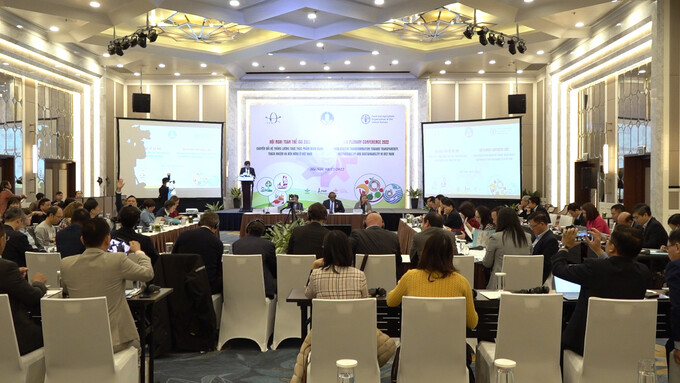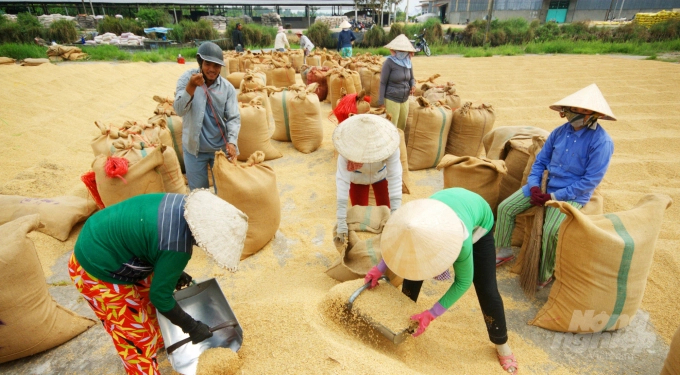June 21, 2025 | 01:03 GMT +7
June 21, 2025 | 01:03 GMT +7
Hotline: 0913.378.918
June 21, 2025 | 01:03 GMT +7
Hotline: 0913.378.918
In the context of conflict, pandemic and climate crisis in 2022, the disruption of global food and production inputs supply chains plus high food prices have severely affected food and nutrition security which 8 billion people depend on.
With the motto "Open mindset - Quick action - Real results", the Ministry of Agriculture and Rural Development (MARD) of Vietnam has coordinated with relevant ministries, branches, localities, domestic and international experts to research and construct the draft “National Action Plan to Transform the Food System towards Transparency, Responsibility and Sustainability” with the goal of contributing to the implementation of the 2030 Sustainable Development Goals (SDGs), actively participate in ensuring global food and nutrition security.

The conference, organized by MARD, sought consultations with stakeholders, so that the Action Plan is comprehensive, meeting domestic needs and international integration when promulgated.
Speaking at the International Support Program (ISG) Plenary Conference 2022 taking place in Hanoi on December 8, Nguyen Do Anh Tuan, Director of International Cooperation Department (MARD), said, “The overall goal of the plan is to transform the food system towards transparency, responsibility and sustainability, contributing to the implementation of the 2030 Sustainable Development Goals as committed to the international community. The plan emphasizes ensuring food security, nutrition security, applying good cultivation, production, processing, distribution procedures, and ensuring environmental safety.”
In terms of viewpoints, this National Action Plan is the basic and most important task in the process of implementing the 2030 SDGs, responsible for effectively contributing to regional and national food security. The implementation of the plan is based on a global approach with the coordination of all countries, making the most of international support and assistance. This is an interdisciplinary action, requiring the direct participation of many ministries and branches such as the Ministry of Industry and Trade, the Ministry of Health, the Ministry of Natural Resources and Environment, and is carried out simultaneously at many levels from central to local levels under the uniform supervision and administration of the Government.
Some specific goals of the action plan include: Rural population's income being 2 times higher than that of 2020, income in difficult areas increasing 3 times; the number of poisoning cases due to not ensuring food safety and hygiene decrease by 5%/year; over 90% of agroproduction areas for export are granted codes, the number of registered and certified animal disease-free zones and establishments increases by 5%/year; over 30% of the fertilizer supply is organic, the amount of organic fertilizer used increases 2 times compared to 2020; circular agriculture, production according to GAP processes are further promoted.

The plan will deploy five main groups of tasks and solutions, clearly demonstrating transparency, responsibility and sustainability in each stage within the agricultural value chain.
In order to realize the set goals, the action plan will deploy five main groups of tasks and solutions, clearly demonstrating transparency, responsibility and sustainability in each stage within the agricultural value chain from input supply, production to processing, distribution and consumption.
The first group of tasks and solutions in particular is to review, evaluate and perfect mechanisms, policies, processes, standards and regulations for the production, processing and consumption in the direction of transparency, responsibility and sustainability. In this regard, Dr. Tran Dai Nghia, an expert from the international support group, shared with the conference the group’s reports on the review of green agricultural development policies, which are closely related to the transition to a transparent, responsible and sustainable ecological system.
“The goal of the policy review is to somehow create a unified legal corridor. Using levels and characteristics of agroecology (based on FAO research in 2018) as keywords, the expert group reviewed existing policies, especially policies being implemented in the 2021 - 2030 period.
“Among 304 policies, legal documents, administrative decisions, standards, regulations and international commitments related to green, low carbon and ecological agriculture transformation, 245 documents were reviewed in detail, including 13 Resolutions (Central, National Assembly), 29 laws (national and specialized), 40 decrees, 47 circulars, 70 decisions of the Prime Minister, 24 ministerial-level decisions, 22 national standards, regulations and criteria,” said Dr. Tran Dai Nghia.
Through experts’ assessment, the system of legal documents related to promoting green, low-carbon and climate change adaptation is comprehensive and complete in some senses, but there remain many inadequacies and gaps. The continuity and consistency between laws and sub-law documents is overlapping. Plans and programs have many activities but lack the allocation of financial resources, leading to questionable feasibility and limitations in the implementation process.
Dr. Tran Dai Nghia also made a number of recommendations at the conference: prioritize the review of laws and sub-law documents, new strategies and plans issued for the 2021 - 2030 period to make recommendations on amendments, supplements, consolidation, removal of inadequacies, overlapping conflicts to keep up with changes in the domestic and international contexts; ensure close association and harmonization of potential socio-economic - environmental benefits, integrate multi-value, carbon sequestration, climate resilience and protect agro-ecosystems in a sustainable way; strengthen interaction, consultation and coordination among relevant ministries and sectors in the process of revising, consolidating and perfecting the policy system to ensure connectivity, consistency and feasibility.
Translated by Samuel Pham
![Turning wind and rain into action: [9] Digitizing hydrometeorological data in response to climate change](https://t.ex-cdn.com/nongnghiepmoitruong.vn/608w/files/news/2025/06/17/z6704423696987_15fd32ffc26d590d204d520c9dac6786-nongnghiep-165943.jpg)
(VAN) Farmers have begun accessing hydrometeorological applications to adjust their cropping schedules, aiming to ensure productivity and adapt to climate change.
![Turning wind and rain into action: [8] Real-time salinity detection and early warning technology](https://t.ex-cdn.com/nongnghiepmoitruong.vn/608w/files/news/2025/06/17/z6704423696987_15fd32ffc26d590d204d520c9dac6786-nongnghiep-151127.jpg)
(VAN) Thanks to the integration of modern hydrological-hydraulic models, remote sensing technologies, and artificial intelligence, the accuracy of hydrological forecasting has significantly improved.
![Turning wind and rain into action: [7] Early disaster warnings help marine farmers minimize losses](https://t.ex-cdn.com/nongnghiepmoitruong.vn/608w/files/news/2025/06/17/z6704423696987_15fd32ffc26d590d204d520c9dac6786-nongnghiep-142942.jpg)
(VAN) In recent years, thanks to early disaster warnings and forecasting, marine farmers in Khanh Hoa province have been able to reduce risks and losses, thereby improving production efficiency.
![Turning wind and rain into action: [6] ‘Four on-the-spot’ disaster management software](https://t.ex-cdn.com/nongnghiepmoitruong.vn/608w/files/news/2025/06/17/e5a48259d6a262fc3bb3-nongnghiep-183800.jpg)
(VAN) By simply activating the scenario on the disaster management software, the relevant authorities immediately know how many households need to be evacuated, where to evacuate them to, and by what means of transportation…
![Turning wind and rain into action: [5] Hue applies modern technology in disaster forecasting](https://t.ex-cdn.com/nongnghiepmoitruong.vn/608w/files/news/2025/06/17/z6704423696987_15fd32ffc26d590d204d520c9dac6786-nongnghiep-093938.jpg)
(VAN) In Hue city, modern technology has recently been applied in meteorological and hydrological forecasting and warning, helping to reduce the damage caused by natural disasters.

(VAN) A cutting-edge farming technique being implemented on an experimental ranch in Arizona's Sonoran Desert has already saved a billion gallons of water over five years, according to Civil Eats.

(VAN) Poultry and pig production and the environment can be boosted through enhanced water technology, according to new research.